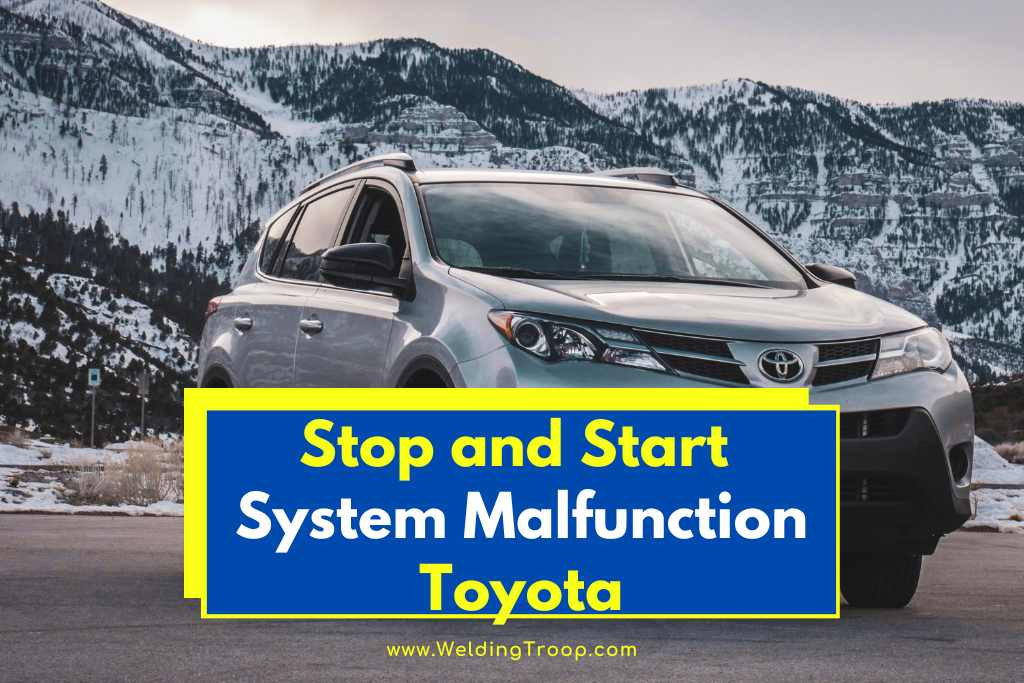Toyota has gained a reputation as one of the most popular car brands worldwide, known for its stellar performance and cost-efficiency. However, like any other vehicle, Toyotas are not immune to issues, and one common problem that owners may encounter is a malfunction in the stop/start system.
While this may not be a serious concern, it can be frustrating to deal with. In this comprehensive guide, we will delve into the stop/start system in Toyotas, understand its benefits, identify the instances in which it may not work, and explore common battery-related issues that can cause the system to malfunction.
By the end of this article, you will be equipped with the knowledge to diagnose and potentially fix this issue.
Table of Contents
How Does the Stop/Start System Benefit Your Toyota?
The stop/start system in a Toyota is designed to turn off the engine when the vehicle would otherwise be idling, such as at a traffic junction.
By automatically restarting the engine when it’s time to move again, this system helps reduce carbon emissions and fuel consumption, making it particularly useful in urban settings where drivers spend a significant amount of time waiting at traffic lights.
While the benefits of the stop/start system may not be as significant during highway driving, it can save a substantial amount of fuel in stop-and-go traffic.
Instances in Which the System Doesn’t Work
Although the stop/start system is designed to function seamlessly, there are instances where it may not work as expected. Let’s explore some common reasons behind the malfunction:
Seatbelts Unfastened
One trivial yet important factor that can prevent the stop/start system from working is the failure to fasten seatbelts. It is essential to ensure that you and your passengers have properly fastened seatbelts for the system to operate correctly.
Steep Slopes
When driving uphill, the stop/start system may act up and fail to function. However, this is not a cause for significant concern, as the system should resume normal operation once you pass the incline.
Open Car Doors and/or Hood
The stop/start system checks whether all doors and the hood of your Toyota are properly closed before initiating the engine start.
If any of these are slightly open, the system may not activate, as driving with open doors or hood can be dangerous. Always ensure that all doors and the hood are securely closed before driving.
Parking Assistant Online
Many Toyota models are equipped with parking assistance features to facilitate easier parking. However, if the parking assistant is active, it can prevent the stop/start system from functioning. Ensure that you disable the parking assistant before expecting the system to work.
Computer Malfunction
The stop/start system relies on a computer to detect the vehicle’s movement, the position of the clutch (or brake pedal pressure in automatic models), and other relevant factors. In some cases, a malfunction in the computer or related programs can disrupt the system’s functionality.
If you suspect a computer issue, it is advisable to take your Toyota to a qualified mechanic for diagnosis and repair.
Design Oversights
In April 2020, Toyota issued a recall for certain Highlander models due to problematic stop/start systems that would turn off the engine even while the vehicle was in motion.
If you own a Toyota Highlander manufactured before this date and are experiencing issues with the stop/start system, it is crucial to visit your dealership for further investigation. This issue is significant and could potentially lead to accidents.
Read also >> Toyota Charging System Malfunction (Here Is How To Fix)
Read also >> Toyota Electric Power Steering Problems (Here Is How To Fix)
Battery-Related Issues That Might Cause Malfunction
As the stop/start system relies on electrical power, any disruption in the power supply can affect its performance. Consequently, it is important to pay attention to the condition of your car battery. Let’s explore some battery-related issues that may cause the stop/start system to malfunction:
Battery Overload
Your car’s battery is responsible for supplying power to various electronic components. If you overload the battery, particularly with heavy power-consuming features like ventilation, the battery may not be able to meet the demands of the stop/start system.
In some Toyota models, instead of disabling the stop/start system, the air conditioning may run on lower settings to prevent excessive power consumption.
High or Low Engine Temperature
The initial start-up of your Toyota’s engine requires a higher electric current, especially when the engine is cool. Similarly, in the case of an overheating engine, the cooling fan consumes a significant amount of power.
In both these situations, the stop/start system may not operate as the engine prioritizes other functions to ensure safe operation.
It is important to monitor engine temperature and address any overheating issues promptly.
Low Battery Charge
Leaving your Toyota unused for an extended period can lead to battery drain. When you start your vehicle after such a period, the battery may not have enough power to supply all components, resulting in the conservation of power for essential functions like engine start-up.
This conservation may include disabling non-vital components such as the stop/start system. Additionally, leaving headlights or interior lights on can also drain the battery. Always double-check that all lights are switched off.
Damaged Battery
If your battery is not sufficiently charged, despite regular use of your Toyota, it may indicate a faulty battery that needs replacement.
Inspect the battery for any signs of damage, such as corroded connectors or a distorted shape. Faulty batteries not only affect the stop/start system but can also impact other electronic components in your vehicle.
If you notice multiple electronic malfunctions, it is advisable to replace your battery.
Faulty Alternator
The alternator plays a crucial role in supplying power to the vehicle’s electronics while in motion and recharging the battery.
If the stop/start system malfunctions and the battery appears to be in good condition, it is worth inspecting the alternator for any faults or issues that may affect its performance.
Wrong Battery Type
It is important to ensure that your Toyota is equipped with the appropriate battery type for a stop/start system. Stop/start batteries are specifically designed to handle the frequent starting and stopping of the engine, providing a consistent power supply.
Using standard batteries that are not designed for this purpose may cause the system to shut down due to inadequate power supply.
Broken Battery Sensor
While rare, a faulty battery sensor can also contribute to the malfunction of the stop/start system. However, it is important to address other potential causes before concluding that the battery sensor is at fault.
If you suspect a battery sensor issue, consult with a mechanic to diagnose and resolve the problem.
Toyota start stop mode messages. Why it wont engage demonstration. >> Check out the video below:
Conclusion
In conclusion, the stop/start system in Toyota models offers several advantages, including fuel conservation and reduced carbon emissions. However, issues can arise, and understanding the potential causes of a malfunction is crucial for diagnosis and resolution.
This comprehensive guide has explored the benefits of the stop/start system, instances in which it may not work, and common battery-related issues that can lead to its malfunction. By being aware of these factors, Toyota owners can effectively troubleshoot and potentially resolve any stop/start system issues.
If the problem persists or if there are concerns about safety, it is recommended to consult with a qualified mechanic or visit a Toyota dealership for professional assistance.

